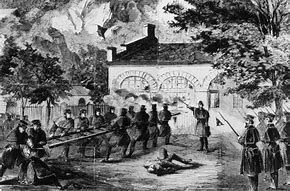
Free Republic University, Department of History presents U.S. History, 1855-1860: Seminar and Discussion Forum
Bleeding Kansas, Dred Scott, Lincoln-Douglas, Harper’s Ferry, the election of 1860, secession – all the events leading up to the Civil War, as seen through news reports of the time and later historical accounts
First session: November 21, 2015. Last date to add: Sometime in the future.
Reading: Self-assigned. Recommendations made and welcomed.
Posting history, in reverse order
To add this class to or drop it from your schedule notify Admissions and Records (Attn: Homer_J_Simpson) by reply or freepmail.
Link to previous thread
To: chajin; henkster; CougarGA7; BroJoeK; central_va; Larry Lucido; wagglebee; Colonel_Flagg; Amagi; ...
Our Serials and Our Circulation – 1
Sketches of People Who Oppose Our Sunday Laws: No. II, Sunday Evening in a Beer Garden – 1-3
The Village Barber – 3
Editorials – 3-5
The Lounger – 5-6
The English Cricketers – 6-7
Trumps, by George William Curtis, Ch. LX-LXII – 8-10
Cricket and Baseball – 11-12
Tom Rocket – 12-13
A Good Fight, by Charles Reade, Ch. XXXII-XXXVII – 13-16
Juan Rafael Mora, Ex-President of Costa Rica – 16-17
A Tale of Two Cities, by Charles Dickens, Book III, Ch VI-VII – 18-20
Humors of the Day – 20
Scene-A Fashionable Place on the Sea-Shore – 21
On Board the Rival Line to California – 21
2 posted on
10/15/2019 5:20:25 AM PDT by
Homer_J_Simpson
("Every nation has the government that it deserves." - Joseph de Maistre (1753-1821))
To: chajin; henkster; CougarGA7; BroJoeK; central_va; Larry Lucido; wagglebee; Colonel_Flagg; Amagi; ...
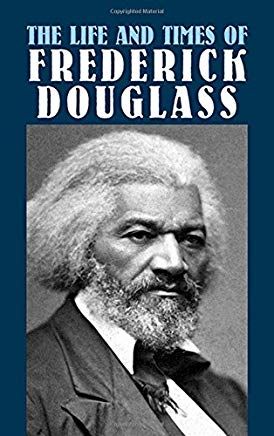
Continued from September 14
(reply #9) .
1
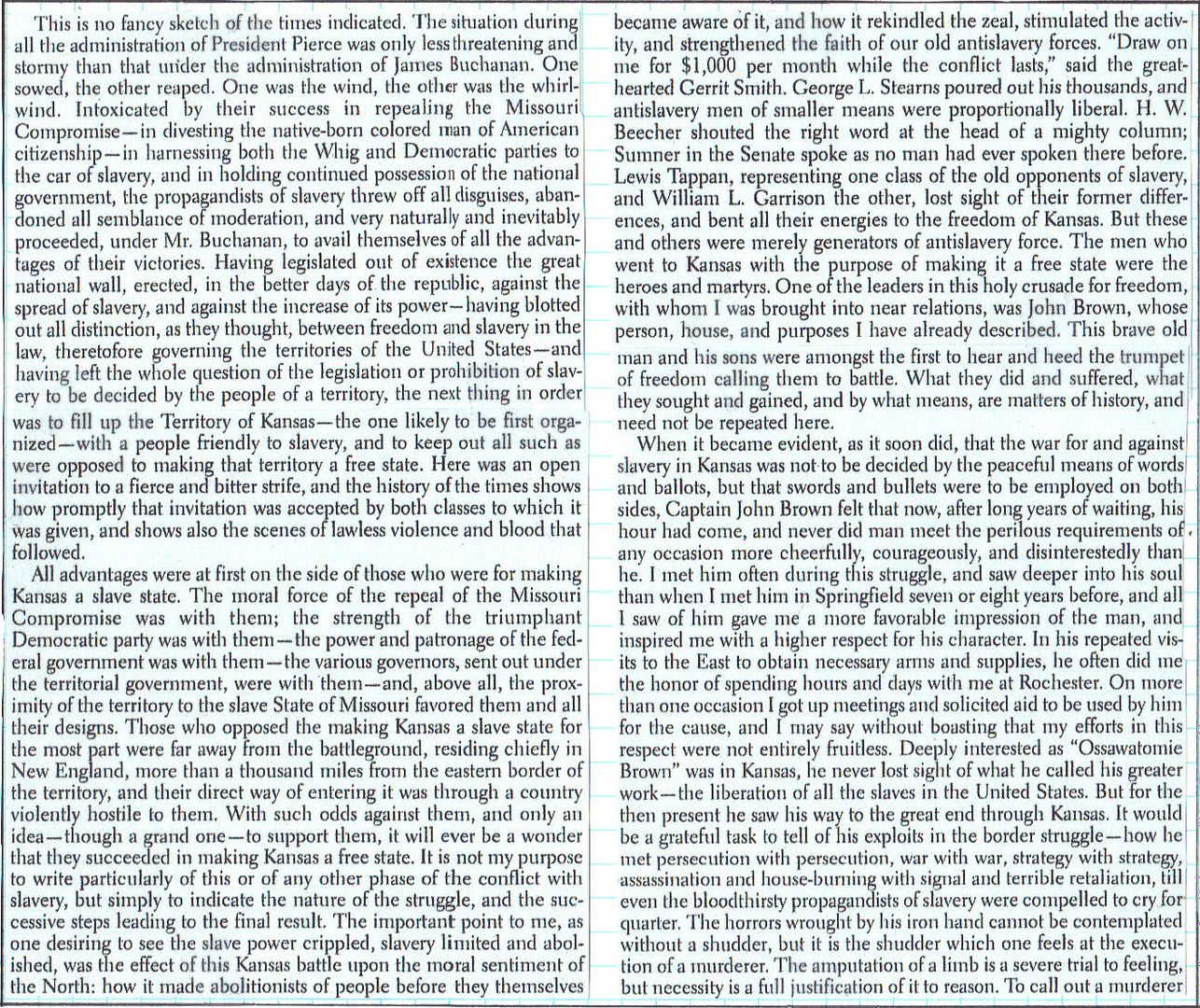
2
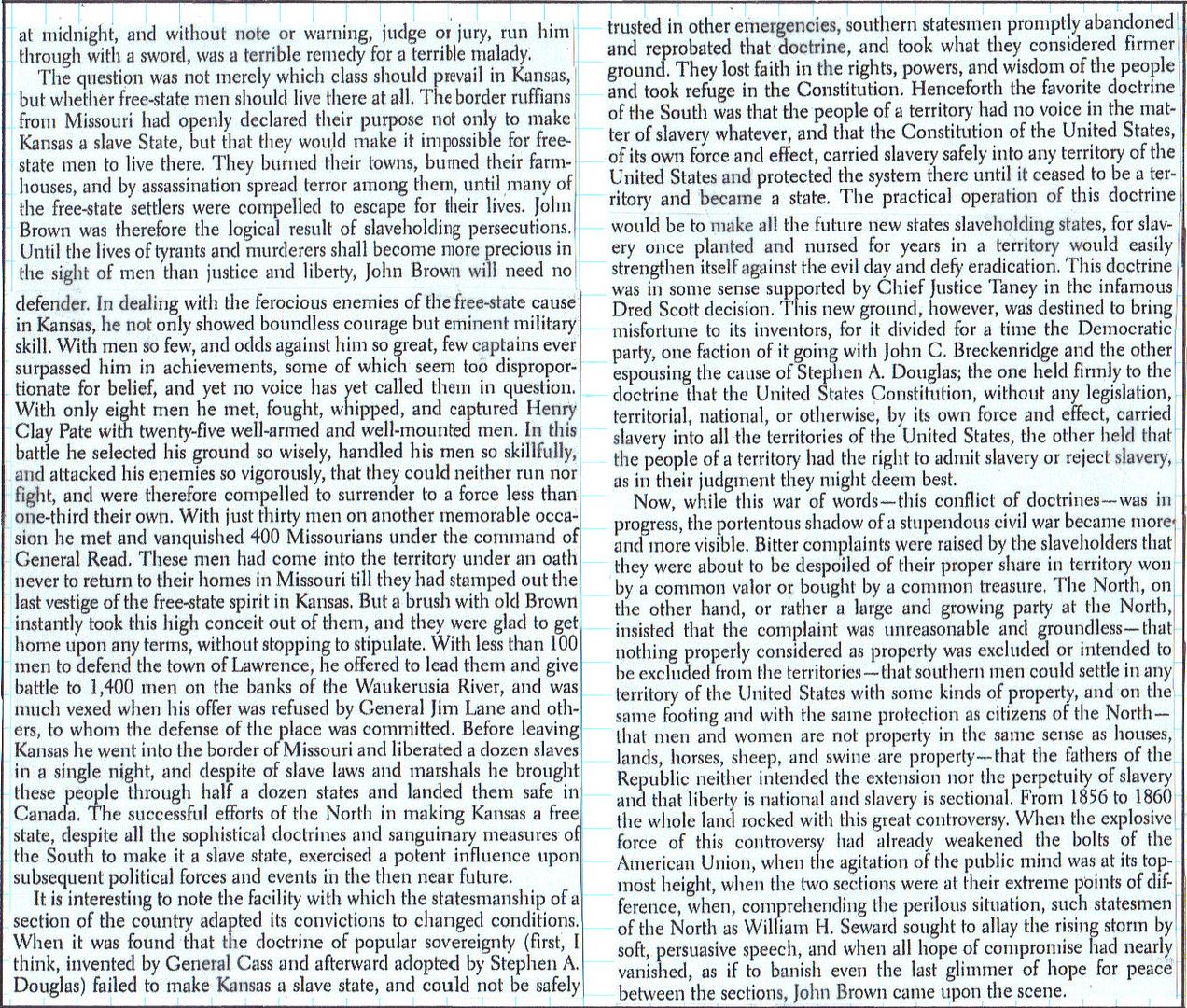
The Life and Times of Frederick Douglass, an autobiography
3 posted on
10/15/2019 5:22:44 AM PDT by
Homer_J_Simpson
("Every nation has the government that it deserves." - Joseph de Maistre (1753-1821))
To: chajin; henkster; CougarGA7; BroJoeK; central_va; Larry Lucido; wagglebee; Colonel_Flagg; Amagi; ...
[Continued from October 6
(reply #11.) ]
October 15. Entered George Anthon with a telegram from Richmond to his revered papa. “Unconditional restoration” (of Bishop Onderdonk) “voted down in the House of Bishops by twenty-six against eight.” Very right and wise, I think. But won’t they agree on some compromise between restoration pure and simple and restoration with jurisdiction? This looks unlike it, to be sure. . . .
The Diary of George Templeton Strong, Edited by Allan Nevins and Milton Halsey Thomas
4 posted on
10/15/2019 5:27:09 AM PDT by
Homer_J_Simpson
("Every nation has the government that it deserves." - Joseph de Maistre (1753-1821))
To: chajin; henkster; CougarGA7; BroJoeK; central_va; Larry Lucido; wagglebee; Colonel_Flagg; Amagi; ...
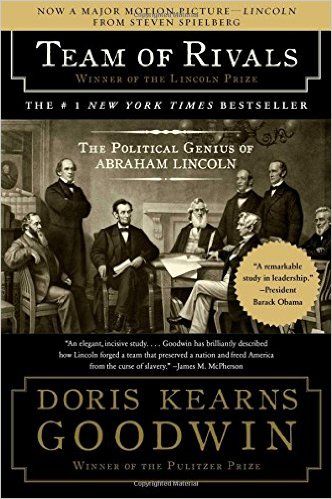
Continued from September 17 (reply #3).
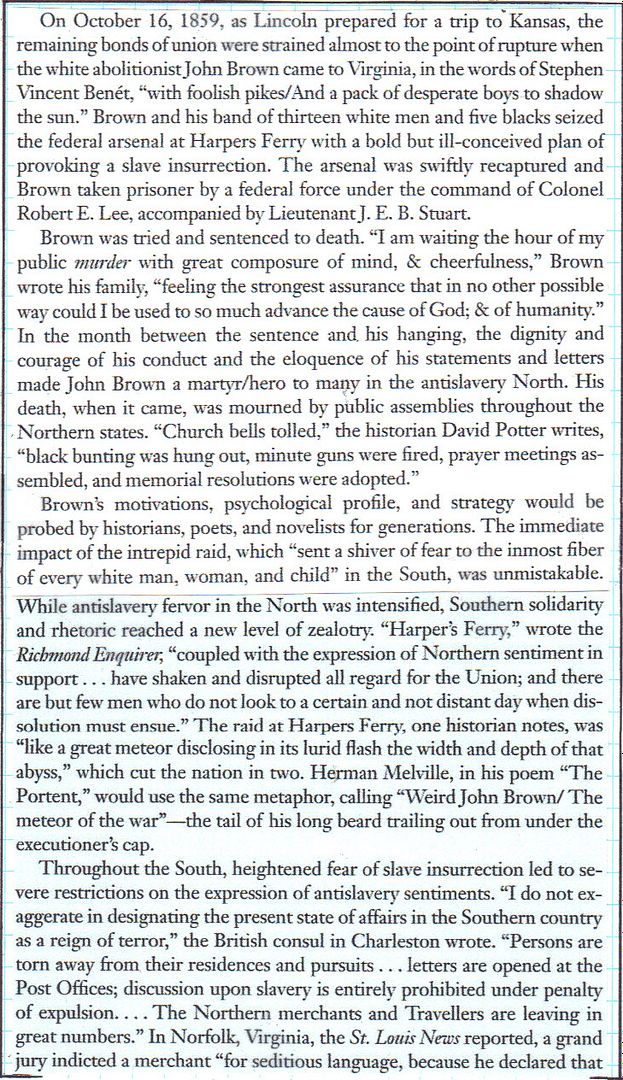
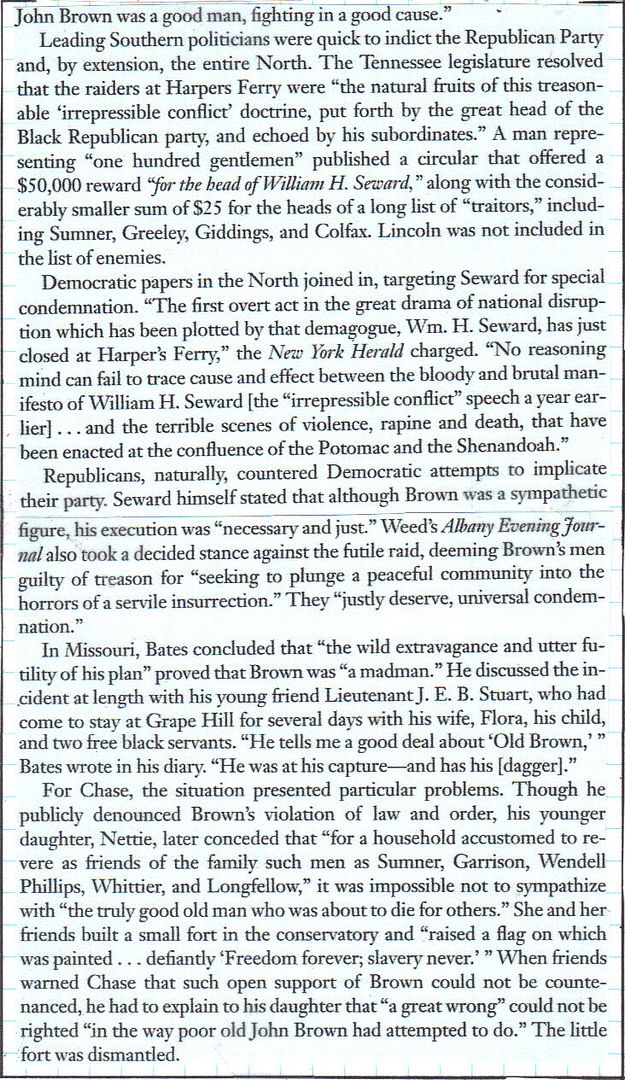
Doris Kearns Goodwin, Team of Rivals
6 posted on
10/16/2019 5:03:27 AM PDT by
Homer_J_Simpson
("Every nation has the government that it deserves." - Joseph de Maistre (1753-1821))
To: chajin; henkster; CougarGA7; BroJoeK; central_va; Larry Lucido; wagglebee; Colonel_Flagg; Amagi; ...
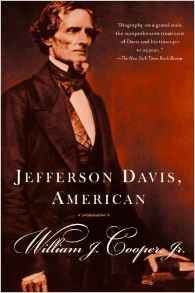
Continued from April 18 (reply #10) .
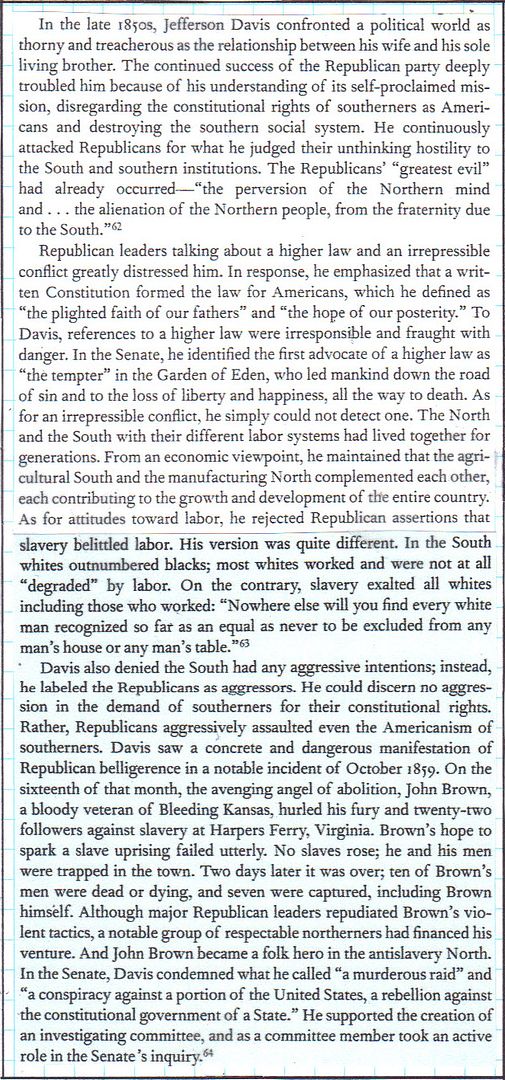
William J. Cooper, Jr., Jefferson Davis, American
7 posted on
10/16/2019 5:05:22 AM PDT by
Homer_J_Simpson
("Every nation has the government that it deserves." - Joseph de Maistre (1753-1821))
To: Homer_J_Simpson
The last time a major American publication would feature the game of cricket?
10 posted on
10/16/2019 7:56:23 AM PDT by
C19fan
To: chajin; henkster; CougarGA7; BroJoeK; central_va; Larry Lucido; wagglebee; Colonel_Flagg; Amagi; ...
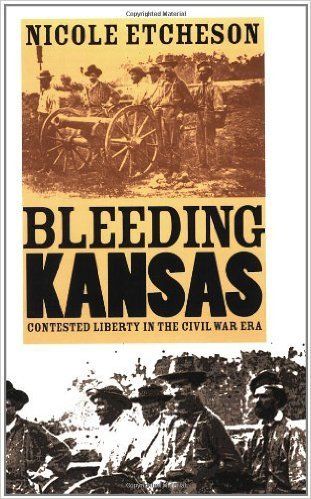
Continued from October 4 (reply #8) .
1
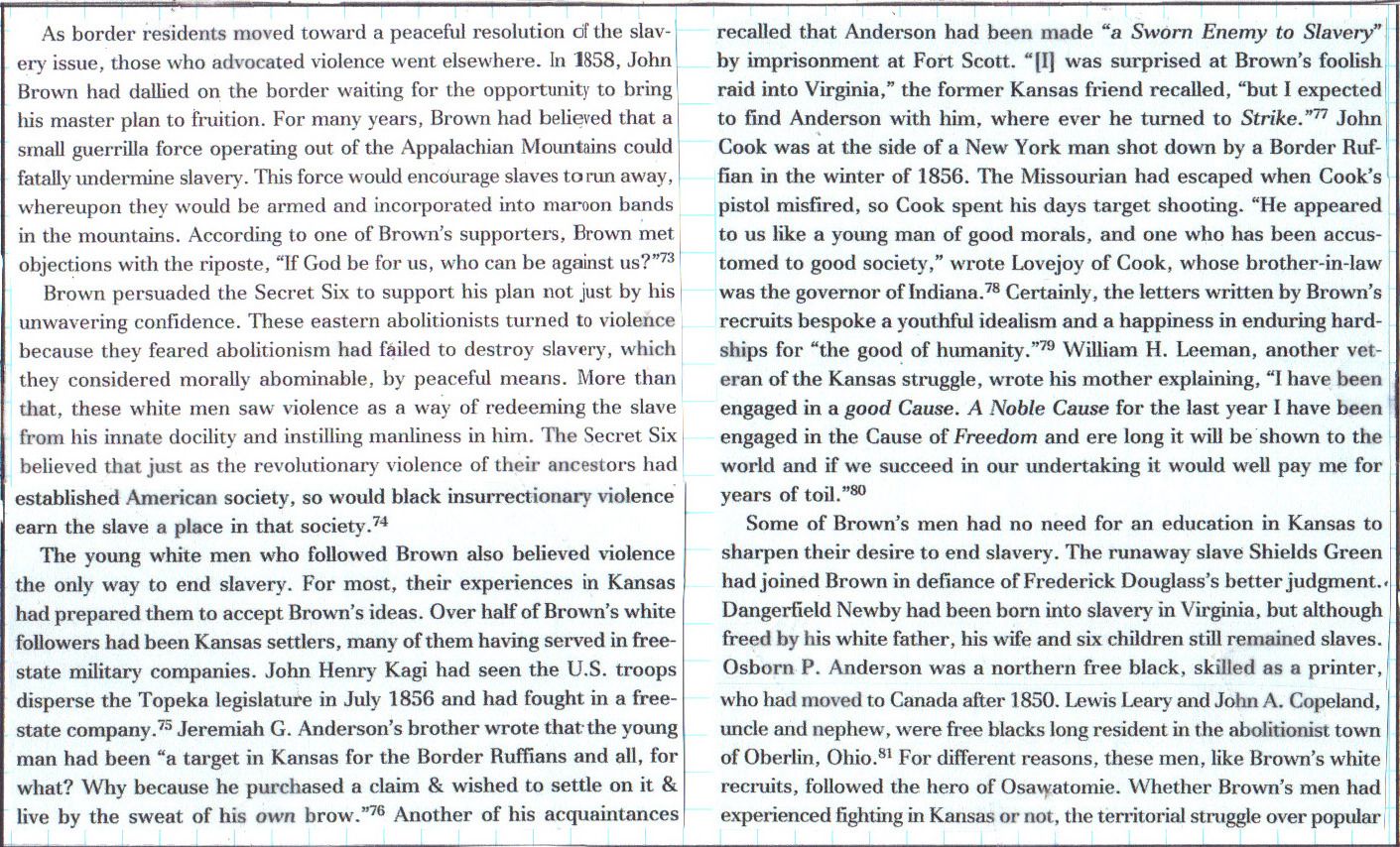
2
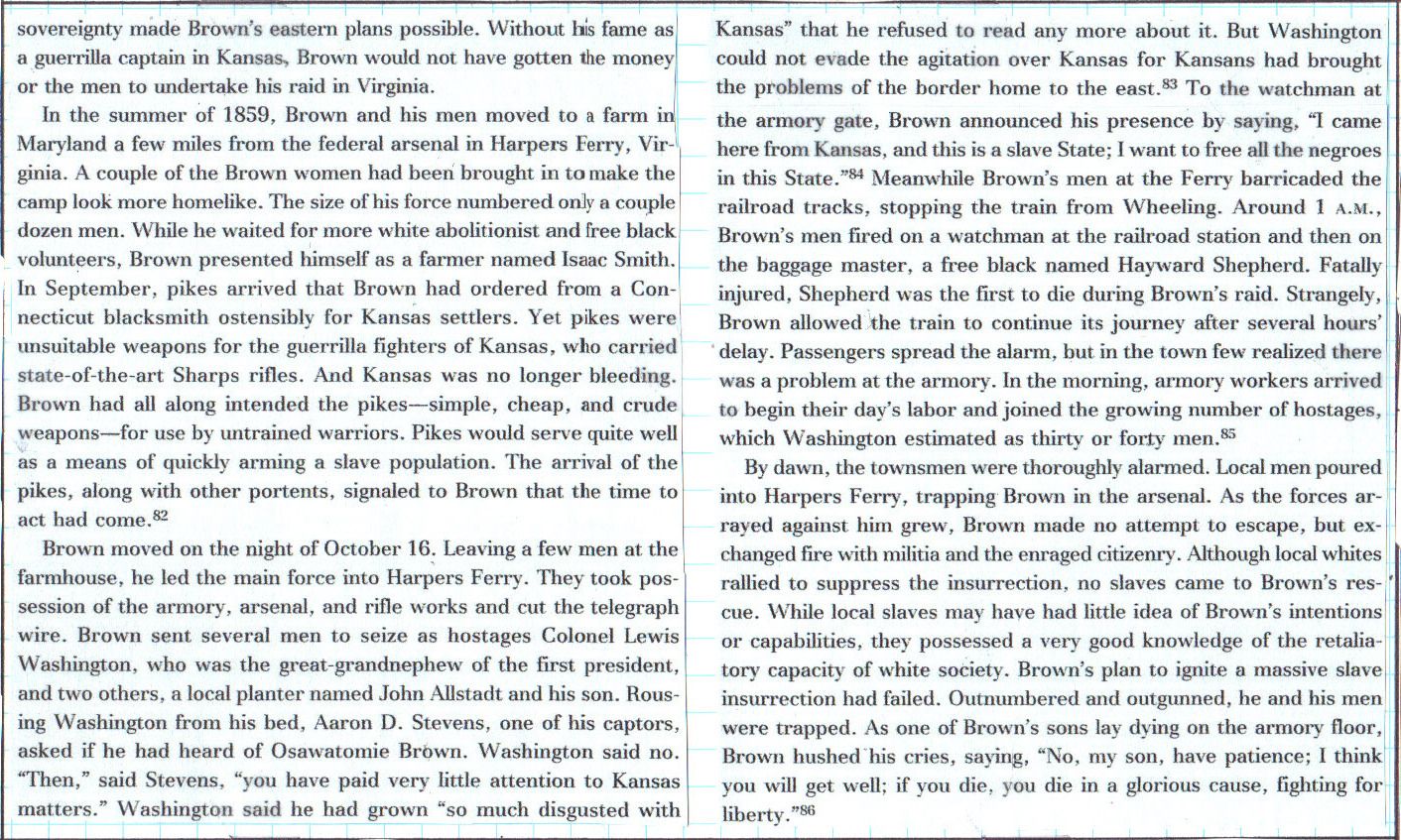
Nicole Etcheson, Bleeding Kansas: Contested Liberty in the Civil War Era
12 posted on
10/17/2019 4:59:11 AM PDT by
Homer_J_Simpson
("Every nation has the government that it deserves." - Joseph de Maistre (1753-1821))
To: chajin; henkster; CougarGA7; BroJoeK; central_va; Larry Lucido; wagglebee; Colonel_Flagg; Amagi; ...
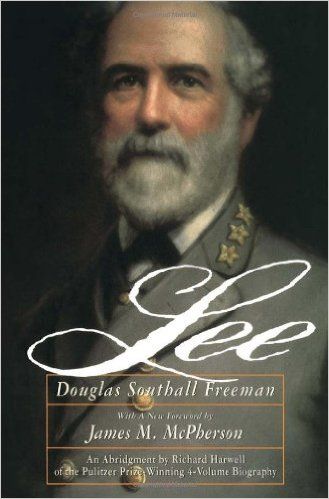
Continued from March 23 (reply #6.)
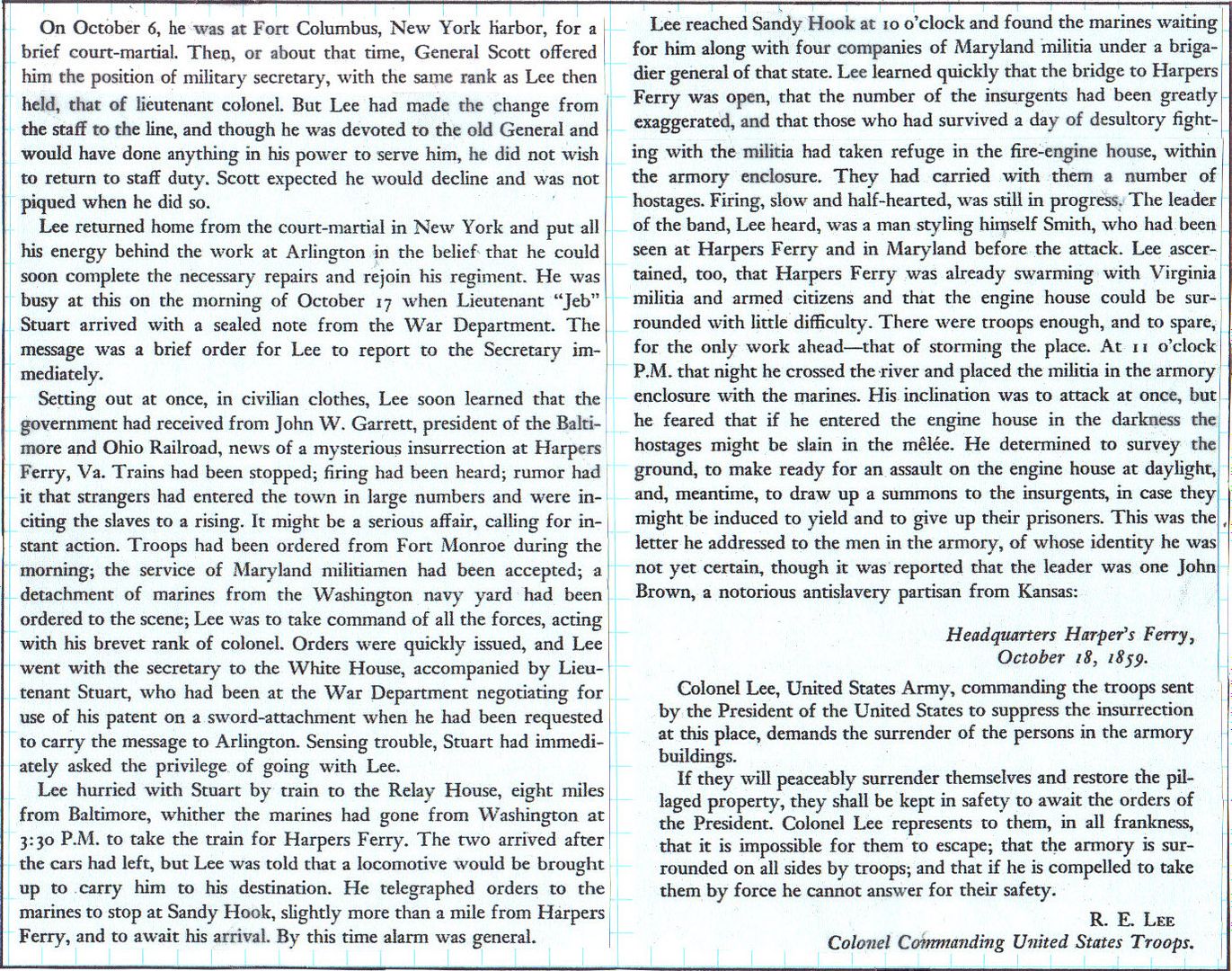
Douglas Southall Freeman, Lee, an abridgement by Richard Harwell
13 posted on
10/17/2019 5:01:34 AM PDT by
Homer_J_Simpson
("Every nation has the government that it deserves." - Joseph de Maistre (1753-1821))
To: chajin; henkster; CougarGA7; BroJoeK; central_va; Larry Lucido; wagglebee; Colonel_Flagg; Amagi; ...
John Brown to Major William W. Russell, October 18, 1859 My name is John Brown; I have been well known as Old Brown of Kansas. Two of my sons were killed here to-day, and I'm dying too. I came here to liberate slaves, and was to receive no reward. I have acted from a sense of duty, and am content to await my fate; but I think the crowd have treated me badly. I am an old man. Yesterday I could have killed whom I chose; but I had no desire to kill any person, and would not have killed a man had they not tried to kill me and my men. I could have sacked and burned the town, but did not; I have treated the persons whom I took as hostages kindly, and I appeal to them for the truth of what I say. If I had succeeded in running off slaves this time, I could have raised twenty times as many men as I have now, for a similar expedition. But I have failed.
SOURCE: Franklin B. Sanborn, The Life and Letters of John Brown, p. 560-1
civilwarnotebook.blogspot.com
John Brown to Mr. Mills, Master of the Harper’s Ferry Armory, October 18, 1859
We are Abolitionists from the North, come to take and release your slaves; our organization is large, and must succeed. I suffered much in Kansas, and expect to suffer here, in the cause of human freedom. Slaveholders I regard as robbers and murderers; and I have sworn to abolish slavery and liberate my fellow-men.
SOURCE: Franklin B. Sanborn, The Life and Letters of John Brown, p. 561; "The Harper's Ferry Rebellion," The New York Times, New York, New York, Thursday, October 20, 1859, p. 1
civilwarnotebook.blogspot.com
Lewis E. Harvey to Senator Robert M. T. Hunter, October 18, 1859
RICHMOND, [VA.], October 18th, 1859.
DEAR HUNTER: I have been expecting a letter from you for some time past. And I write now to know whether the correspondence by your friends hereabouts has been politic and prudent and such as you approve. The fact is that without hearing from you frequently, we feel at a loss how to act. As to Douglas, for instance, it was necessary to take action and we did so, upon reflection unaided by our friends elsewhere. Was our course good or bad? Now in regard to this Harper's Ferry imbroglio, in its political bearing or that which it will be made to assume by designing men, we should like to hear your views. Of course we will stand up to and by our section “at all hazards and to the last extremity,” but we do not desire nor design that this outbreak should be used to subserve the selfish purposes or schemes of profligate and unprincipled politicians.
We have been very still and quiet of late, thinking that it was best; on me rely to write freely and fully, you know that you can do so unreservedly. Wm Old's eyes are still, too bad to be used. He is now staying with Frank Ruffin and can give more active supervision to the paper than he has been able heretofore to do. Jack Barbour thinks that things are moving well and that quiescence now is the best policy. He is very hopeful. He has been North and East as far as Boston. He thinks Douglas is done and you rising.
SOURCE: Correspondence of Robert M. T. Hunter, 1826-1876, p. 272-3
civilwarnotebook.blogspot.com
John Brown to a Reporter, either October 18 or 19, 1859
I intended to remain here but a few hours, but a lenient feeling towards the citizens led me into a parley with them as to compromise; and by prevarication on their part I was delayed until attacked, and then in self-defence was forced to intrench myself.
SOURCE: Franklin B. Sanborn, The Life and Letters of John Brown, p. 561; “The Harper’s Ferry Rebellion,” The New York Times, New York, New York, Thursday, October 20, 1859, p. 1.
civilwarnotebook.blogspot.com
16 posted on
10/18/2019 5:10:44 AM PDT by
Homer_J_Simpson
("Every nation has the government that it deserves." - Joseph de Maistre (1753-1821))
To: chajin; henkster; CougarGA7; BroJoeK; central_va; Larry Lucido; wagglebee; Colonel_Flagg; Amagi; ...
John Brown's Interview with Senator James M. Mason, Congressman Clement L Vallandigham, and Others, October 19, 1859 This is a long interview. So long I didn’t feel like adding html formatting to the whole thing. But it is worth the read so here is the link.
civilwarnotebook.blogspot.com
20 posted on
10/19/2019 6:27:23 AM PDT by
Homer_J_Simpson
("Every nation has the government that it deserves." - Joseph de Maistre (1753-1821))
To: chajin; henkster; CougarGA7; BroJoeK; central_va; Larry Lucido; wagglebee; Colonel_Flagg; Amagi; ...
John Brown to Judge Thomas Russell,* October 21, 1859 CHARLESTOWN, JEFFERSON COUNTY, VA., Oct. 21, 1859.
HON. THOMAS RUSSELL.
DEAR SIR, — I am here a prisoner, with several sabre-cuts in my head and bayonet-stabs in my body. My object in writing to you is to obtain able and faithful counsel for myself and fellow-prisoners (five in all), as we have the faith of Virginia pledged through her Governor and numerous other prominent citizens to give us a fair trial. Without we can obtain such counsel from without the slave States, neither the facts in our case can come before the world, nor can we have the benefit of such facts as might be considered mitigating in the view of others upon our trial. I have money in hand here to the amount of two hundred and fifty dollars, and personal property sufficient to pay a most liberal fee to yourself, or to any suitable man who will undertake our defence, if I can be allowed the benefit of said property. Can you or some other good man come on immediately, for the sake of the young men prisoners at least? My wounds are doing well. Do not send an ultra Abolitionist.
Very respectfully yours,
JOHN BROWN.
Indorsed, "The trial is set for Wednesday next, the 25th inst. — J. W. Campbell, Sheriff of Jefferson County.”
_______________
* A copy of this letter was also sent to Reuben A. Chapman, of Springfield, Mass., and a third to Daniel R. Tilden, of Ohio.
SOURCES: Franklin B. Sanborn, The Life and Letters of John Brown, p. 578-9
civilwarnotebook.blogspot.com
Extract of Speech of Governor Henry A. Wise, October 21, 1859
And they are themselves mistaken who take Brown to be a madman. He is a bundle of the best nerves I ever saw: cut and thrust and bleeding, and in bonds. He is a man of clear head, of courage, fortitude, and simple ingenuousness. He is cool, collected, and indomitable, and it is but just to him to say that he was humane to his prisoners as attested to me by Colonel Washington and Mr. Mills, and he inspired me with great trust in his integrity as a man of truth. He is a fanatic, vain and garrulous, but firm, truthful, and intelligent. His men, too, who survive, except the free negroes with him, are like him. He professes to be a Christian in communion with the Congregational Church of the North, and openly preaches his purpose of universal emancipation; and the negroes themselves were to be the agents, by means of arms, led on by white commanders.
When Colonel Washington was taken, his watch, and plate, and jewels, and money were demanded, to create what they call a ‘safety fund,’ to compensate the liberators for the trouble and expense of taking away his slaves. This, by a law, was to be done with all slaveholders. Washington, of course; refused to deliver up anything; and it is remarkable, that the only thing of material value which they took, besides his slaves, was the sword of Frederick the Great, which was sent to General Washington. This was taken by Stevens to Brown, and the latter commanded his men with that sword in this fight against the peace and safety of Washington's native State! He promised Col. Washington to return it when he was done with it. Colonel Washington says that he was the coolest and firmest man he ever saw in defying danger and death. With one son dead by his side, and another shot through, he felt the pulse of his dying son with one hand, held his rifle with the other, and commanded his men with the utmost composure, encouraging them to be firm, and to sell their lives as dearly as they could. Of the tree white prisoners Brown, Stevens and Coppic – it was hard to say which was most firm; and of the two negroes, it was hard to say which seemed the most cowardly and false. The North Carolina negro offered to betray all person involved in the affair, if spared, and the Canada negro – who was I believed, one of the members of their Provisional Congress – was a crouching craven, who lied, as Brown said, for life.
SOURCES: Franklin B. Sanborn, The Life and Letters of John Brown, p. 571-2; Richard Josiah Hinton, John Brown and His Men, p. 329; The Life and Letters of Captain John Brown, p. 166-8; “Old Brown,” Orleans Independent Standard, Irasburgh, Vermont, Friday November 4, 1859; James, Redpath,The Public Life of Capt. John Brown, p. 273; “Speech of Gov. Wise at Richomnd,” The National Era, Washington, D. C., Thursday, November 3, 1859; “The Insurrection of Harper’s Ferry,” New York Daily Tribune, New York, New York, Saturday, October 22, 1859 which states the date that Wise returned to Richmond on October 21, 1859; “Local Matters,” Daily Dispatch, Richmond, Virginia, Saturday, October 22, 1859, p. 1 which verified Wise “returned to the city yesterday afternoon, from Harper’s Ferry.”
civilwarnotebook.blogspot.com
21 posted on
10/21/2019 4:59:49 AM PDT by
Homer_J_Simpson
("Every nation has the government that it deserves." - Joseph de Maistre (1753-1821))
FreeRepublic.com is powered by software copyright 2000-2008 John Robinson













